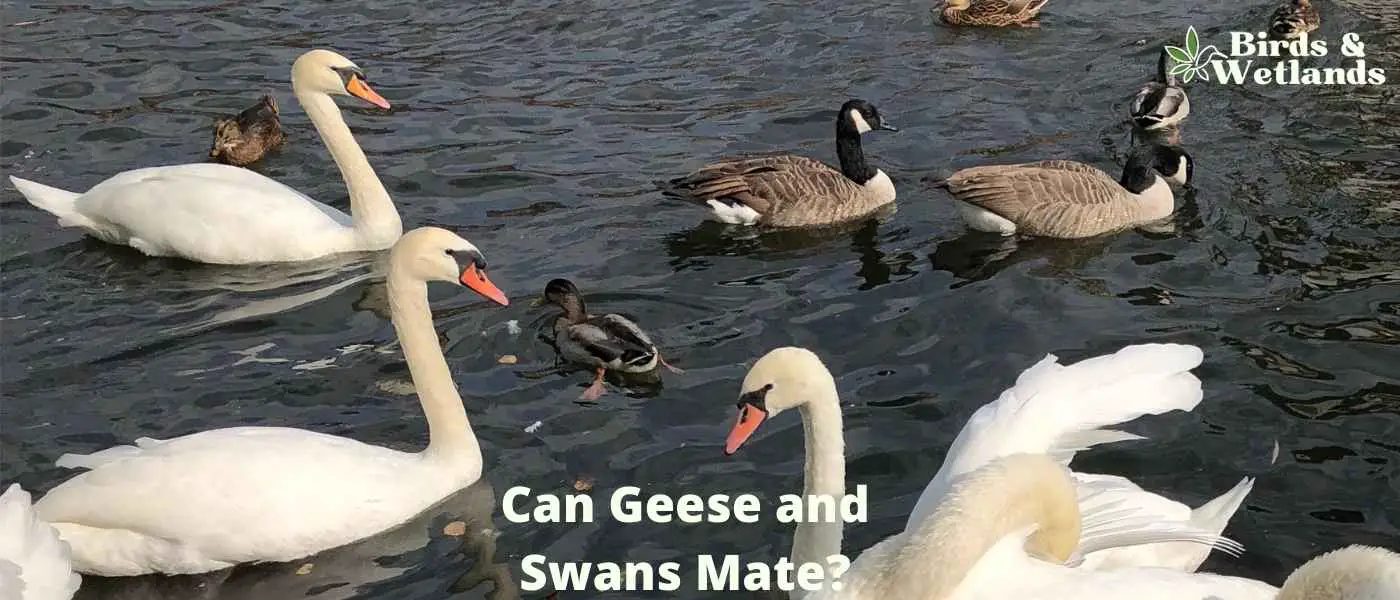Geese and swans are two different types of waterfowl that are often mistaken for each other. Swans are larger than geese, with longer necks too. Another way to tell them apart is by their bill shape – geese have a wide, flat bill, while swans have a long, curved bill.
Geese and swans can mate even though they are from different waterfowl species. The offspring of such a pairing are called “hybrids” and can have characteristics of both parents. Several photos of swooses in the wild have been circulating online.
Many people believe that these birds resulted from interbreeding between geese and swans, but this is pure speculation. None of these supposed swooses have been DNA tested to confirm their parentage.
As far as science goes, hybrids are usually sterile and cannot reproduce themselves. In the wild, hybridization between different waterfowl species is extremely rare, but it can occasionally happen.
Are Geese and Swans Related?
Yes, geese and swans are related. They both belong to the same biological family, which is called Anatidae. However, they are from different genera.
Swans belong to the genus Cygnus while geese belong to either Branta (black geese, Canada goose, and red-breasted goose) or Anser (greylag geese, grey geese, and white geese).
Even though they aren’t the same, it’s easy to see how these two animals could be related. After all, they both have long necks and webbed feet and can fly.
Swans, in particular, are the largest birds in the waterfowl family. They are also considered to be the heaviest birds to fly.
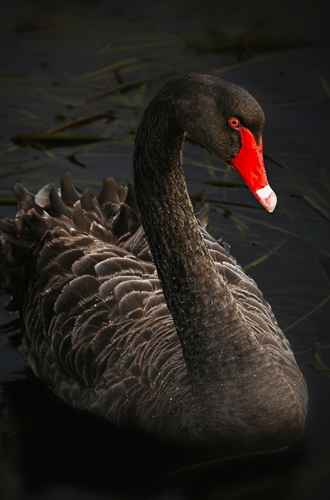
Do Geese Become Swans?
The answer to this question depends on what you mean by the word ‘become’. Geese and swans are members of the waterfowl family, which includes different species of birds.
However, they are two distinct species.
Geese are migratory birds and are generally smaller than swans and have shorter necks and legs. A swan also has a prominent knob at the base of its bill, while a goose does not.
So, in the strictest sense of the word, Canada geese do not “become” swans.
How Are Geese Different From Swans?
Geese and swans share many characteristics. Both love to eat aquatic vegetation. Most goose and swan species also share the same monogamous nature. But swans and geese are different from one another.
- Geese are social birds that live in large groups of other geese even during the breeding season.
- Swans prefer the company of their mate and baby swans.
- Most species of swans and geese mate for life. For instance, a male or female goose will mate for life. When a mate dies, the other pair typically searches for a new mate, sometimes even in the same breeding season.
- Most geese begin to breed around the age of 2 or 3 years, while swans do not begin mating until 4 or 5 years.
- None of the six swans are endangered.
- Some goose species are endangered, particularly the Hawaiian goose.
- Swans have a more aggressive nature than geese.
- Swans often have completely white feathers.
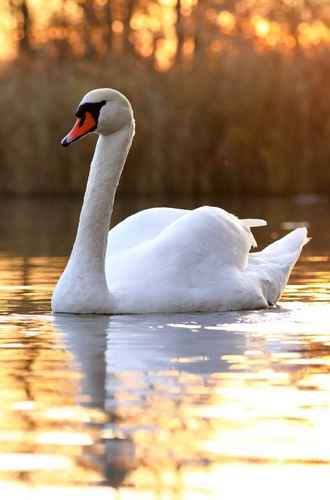
Conclusion on Can Swans and Geese Mate
So, can a goose and a swan mate with each other? Swans and geese are waterfowl birds. They are closely related and belong to the same family. They are not from the same genus.
Both bird species prefer to mate with their own species. It’s even extremely rare that a goose and a swan will want to mate much less breed with the other species.
But there have been rare occasions of interbreeding between these two birds in the wild. However, there are no DNA-verified hybrids.
FAQs on Ducks, Geese, and Swans
Do Mute Swans Mate for Life?
Mute swans are majestic birds often associated with grace and elegance. One of the most notable features of these birds is their white plumage, which adds to their regal appearance.
Adult swans are known for being monogamous, meaning that it mates for life with a single partner. While this is generally the case, there are occasions when a mute swan (Cygnus olor) will change mates, usually due to its partner’s death.
In addition, mute swans form strong pair bonds and have been known to mate for life.
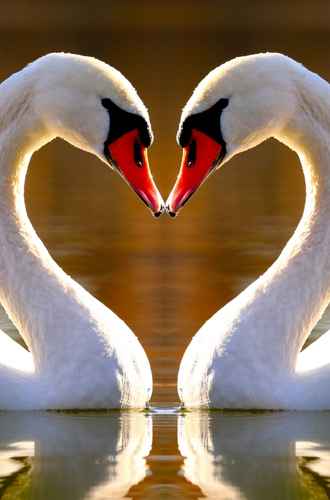
Do Tundra Swans Mate for Life?
Though they are often seen in large flocks, tundra swans mate and breed as lone pairs. These birds spend nearly an entire year pairing up and defending their territories beforehand.
Tundra swans have a strong sense of pair bonding and usually mate for life. Each couple defends a territory of about three-fourths square miles.
The male and female work together to build a nest out of mosses, grasses, and feathers. They will also line the nest with down plucked from their chests.
Once the female swan lays her eggs, both male and female swans take turns incubating them. When the cygnets are born, they are covered in down and can swim almost immediately.
The parents will teach their young how to find food and avoid predators.
After about two months, the family will join with other Swan families to form a flock for the winter. The following spring, the adults and juveniles will disperse to their mating territories.
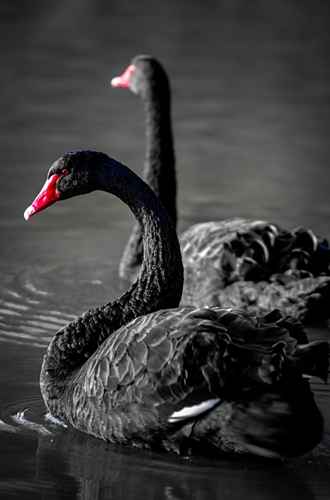
Do Trumpeter Swans Mate for Life?
Trumpeter swans mate for life and are very devoted to their partners. Once a pair has formed a bond, they will stay together forever.
Trumpeter swans are known for their beautiful calls, and these duets are often the result of a long-lasting partnership.
While it is not known exactly why they mate for life, it is clear that trumpeter swans form strong bonds with their mates.
Can a Black Swan Mate With a White Swan?
It is possible for a black swan to mate with a white swan as they are both the same species. However, while it is possible, it is not likely as the two would be considered genetically different.
The only way that this could happen is if the white and black swans were to meet in the wild and form a bond.
If the white and black swans did manage to mate, their offspring would be a hybrid swan. Cross-breeding has been successful in captivity, but it is not known if it could happen in the wild.
Do Swans Make Sounds While Mating?
Swan mating sounds can often be heard when a mated pair of swans are mating. These sounds often vary in pitch and intensity.
The male and female swans will vocalize to each other as they touch each other’s bills, and these noises will become louder and more frequent as they move closer to mating.
While the exact reason swans make noise during mating is not fully understood, it is believed that the noises help reinforce the bond between the male swan and his mate.
The loud noises may also help scare off potential predators that could disrupt the mating process.
Whatever the reason, it is clear that swans are quite vocal creatures, and their mating calls can be pretty loud and startling.
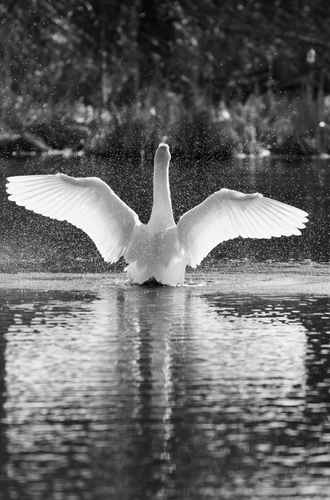
Do Geese Tend to Be More Docile Than Swans?
A swan is generally considered more graceful and elegant than a goose, but does that mean they’re more docile? A goose is generally more docile than swans, but that doesn’t mean they can’t still be quite aggressive.
A goose is likely to attack if it feels threatened or if its nesting area is disturbed, and it can deliver a nasty bite with its sharp beaks. A swan is larger than a goose, so if they do attack, it can be much more damaging.
Ultimately, geese and swans can be aggressive if they need to defend themselves or their territory, so it’s best to give them a wide berth.
Do the Mute Swan Species Live in the Water?
Swans are large, beautiful waterfowl often associated with ponds and other freshwater habitats. It is not uncommon to see them in a large pond, often with other birds and other animals.
While it is true that swans do prefer to live around large bodies of water, they are not limited to ponds alone.
Mute swans, the most common type of swan found in North America, can be found in various habitats, including estuaries, bays, wetlands, and lakes. The only requirement is that the water is shallow enough for the swans to stand and forage.
Do Swans Breed Throughout Their Lives?
Swans are known for their grace and beauty. For example, did you know that swans breed throughout their lives? Once a pair of swans have established a territory and bred, they will continue to breed yearly for the rest of their lives.
Swans tend to mate for life and form life-long pair bonds with each other. Additionally, swans may find a different mate if the other pair dies.
This mating behavior is just one of the many things that make swans such intriguing animals.
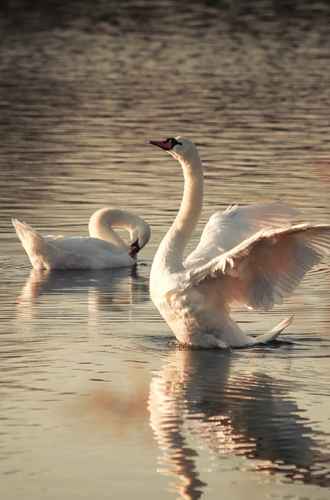
Can a Mallard Duck and a Muscovy Duck Mate?
Mallard ducks and Muscovy ducks are both waterfowl but different species. While they can technically mate, their offspring will be sterile. The reproductive organs of these ducks are not compatible with each other.
Even if the two ducks mate, the vast majority of the time their offspring would be infertile. While this may seem like a moot point, it’s a vital conservation consideration for waterfowl.
If two different species of ducks were to mate and produce a new species of sterile offspring, it could lead to the extinction of one or both species. Therefore, we must separate these two species to ensure their long-term survival.

